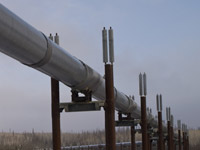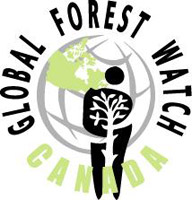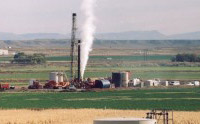
News |
- Controversy Grows Over Fish Lake Mine
- New Power Line to Minnesota
- Blue Planet Prize-Winners Advise Rio +20
- Canada Still Refusing to Issue Order to Protect Caribou
- Four Manitoba Flood 2011 Reviews Announced
- Monsanto Loses Lawsuit, Faces Class Action
- 800,000 Oppose Keystone XL Pipeline
- Hydroelectric Emissions Drastically Underestimated
- Fracking Methane Bombshell
- Manitoba 2010 Climate Report - Shows Rising Emissions
- First Nations Enbridge Opposition Finds Supporters
- A Rally for Peat's Sake - International Wetlands Day
| Controversy Grows Over Fish Lake Mine | 2 March 12 |
 The second attempt by Taseko Mines to obtain required environmental licenses for the "New Prosperity Mine", which once again threatens Fish Lake in British Columbia's interior, continues to attract public controversy.
The second attempt by Taseko Mines to obtain required environmental licenses for the "New Prosperity Mine", which once again threatens Fish Lake in British Columbia's interior, continues to attract public controversy.Taseko's first proposal was rejected November 2, 2010 by then Environmental Affairs Minister Jim Prentice. Public and First Nations concerns over impacts of mining operations on Fish Lake continue. A federal review panel found the proposed mine would cause irreparable damage to both First Nations rights and the environment, including to fish stocks and grizzly populations. The company submitted a revised proposal August 9, 2011, which was accepted by the Canadian Environmental Assessment Agency November 7, 2011. Taseko Mines filed a Notice of Civil Claim against the Western Canada Wilderness Committee March 1st, accusing the Wilderness Committee and its outreach director Sven Biggs for "a series of false and defamatory statements concerning Taseko and its proposed New Prosperity Gold-Copper Project." The Wilderness Committee has vowed to fight the civil claim. "This ill-conceived mine proposal should be turned down once and for all. That's our view and we're standing by it. We believe this court action stifles fair comment about Taseko's environmentally risky mine proposal. People should be able to enjoy full participation in the Federal Environmental Review process, including the right to comment – without fear of time-consuming and costly litigation," said Joe Foy, national campaign director for the Wilderness Committee. View March 2, 2012 Indian Country Today articleView March 2, 2012 Williams Lake Tribune coverage View March 2, 2012 CTV coverage View February 29, 2012 Tsilhqot'in First Nation Press Release View February 16, 2012 Sierra Club BC coverage View November 7, 2011 Sierra Club BC press release View October 28, 2011 Manitoba Wildlands news item View March 2, 2012 Indian Country article View Manitoba Wildlands Aboriginal Rights & Title, Treaties & Traditional Territory Sources:
Sierra Club of BC, Williams Lake Tribune, Indian Country Today
|
|
 Print version Print version |
Top |
| New Power Line to Minnesota | 24 February 12 |
 Minnesota Power is proposing to construct a new transmission line running from Winnipeg, Manitoba, to the Mesabi Iron Range, in north eastern Minnesota.
Minnesota Power is proposing to construct a new transmission line running from Winnipeg, Manitoba, to the Mesabi Iron Range, in north eastern Minnesota.A proposed route and estimated cost for the new line have not been determined. No environmental licenses or construction work permits have been issued. Manitoba Hydro will be responsible for building the line from outside Winnipeg to the U.S. border, and Minnesota Power will be responsible for building the line 340 kilometres to connect to a substation on the Mesabi Iron Range. A new 15-year 250 MW power purchase agreement (PPA) beginning 2020 between Minnesota Power and Manitoba Hydro was announced May 25, 2011. The PPA may require Manitoba Hydro to build new dams in northern Manitoba. The next phase could see Minnesota Power and American Transmission Co. build a 345 KV line from the Measbi Iron Range to Duluth, MN. Existing transmission facilitates at Duluth would allow Manitoba-made power into Wisconsin, where Manitoba Hydro also has PPA with Green Bay-based Wisconsin Public Service Corp. View February 16, 2012 Fresh Energy articleView February 11, 2012 Power Engineering article View February 10, 2012 Winnipeg Free Press article View February 9, 2012 Renew Grid Magazine article View January 26, 2012 Marketwatch article View Manitoba Wildlands Hydro Research & Reports page Sources:
Winnipeg Free Press, Renew Grid Magazine
|
|
 Print version Print version |
Top |
| Blue Planet Prize-Winners Advise Rio +20 | 24 February 12 |
 The twenty past winners of the Blue Planet Prize, often called the Nobel Prize for the environment, presented a report, Environmental and Development Challenges: The Imperative to Act, at the United Nations Environment Programme (UNEP) meeting in Nairobi, Kenya February 20, 2012.
The twenty past winners of the Blue Planet Prize, often called the Nobel Prize for the environment, presented a report, Environmental and Development Challenges: The Imperative to Act, at the United Nations Environment Programme (UNEP) meeting in Nairobi, Kenya February 20, 2012.The stark assessment of the current global outlook commissioned by UNEP was prepared by agroup, that includes: Sir Bob Watson, United Kingdom chief scientific adviser on environmental issues; US climate scientist James Hansen; Prof José Goldemberg, Brazil's secretary of environment during the 1992 Rio Earth Summit; and Stanford University Prof Paul Ehrlich.. The report will feed into texts for the Rio +20 Earth Summit conference June 2012. The report warns against over-reliance on markets and urges politicians to listen and learn from how poor communities all over the world see the problems of energy, water, food and livelihoods as interdependent and integrated as part of a living ecosystem. View February 17, 2012 Blue Planet Laureate reportView February 21, 2012 Inter Press Service article View February 20, 2012 Guardian article View February 20, 2012 Common Dreams article View February 20, 2012 Business Green article View February 11, 2012 UNEP news article View Manitoba Wildlands Earth Summit page Sources:
Guardian, UNEP
|
|
 Print version Print version |
Top |
| Canada Still Refusing to Issue Order to Protect Caribou | 24 February 12 |
 For the second time Canadian Environment Minister Peter Kent has declined to issue an emergency order to protect woodland caribou.
For the second time Canadian Environment Minister Peter Kent has declined to issue an emergency order to protect woodland caribou.The Canadian Government was required to revisit the decision not to issue an emergency order to protect woodland caribou, when a July 2011 Federal Court decision found refusal to make the order contradictory with the very same report relied upon to recommend against emergency protection. The decision also gave the Canadian Government until September 1, 2011 to provide a draft recovery strategy for woodland caribou as required by Species At Risk Act (SARA). The draft recovery strategy was released August 26, 2011 with a February 22, 2012 deadline for public comments. More than 14,000 submissions resulted. Critics of this current draft recovery strategy say it relies too heavily on shooting wolves instead of preserving habitat. They worry the strategy only requires half of Canada's remaining boreal woodland caribou herds to be self-sustaining, and needs of industrial development, particularly in the Alberta oil sands, are coming before the need to protect woodland caribou habitat. View February 21, 2012 Winnipeg Free Press articleView February 16, 2012 Alberta Wilderness Association article View February 2012 Sierra Club Canada report (PDF) View January 29, 2012 CBC article View January 26, 2012 Ecojustice blog post View January 25, 2012 Canadian Press article View Manitoba Wildlands Caribou Strategies page Sources:
Canadian Press, CBC, Winnipeg Free Press
|
|
 Print version Print version |
Top |
| Four Manitoba Flood 2011 Reviews Announced | 17 February 12 |
 Four separate reviews of spring 2011 flooding in Manitoba will be undertaken to determine effectiveness of the flood response and to recommend ways Manitoba can better fight future floods, announced Manitoba Infrastructure and Transportation Minister Steve Ashton February 8, 2012.
Four separate reviews of spring 2011 flooding in Manitoba will be undertaken to determine effectiveness of the flood response and to recommend ways Manitoba can better fight future floods, announced Manitoba Infrastructure and Transportation Minister Steve Ashton February 8, 2012.The 2011 flood review task force chaired by engineer David Farlinger will do the primary review. A second review, chaired by economist and management consultant Harold Westdal, will examine water levels on Lake Manitoba and Lake St. Martin. A third review, to be undertaken by an independent consultant who has yet to be named, will study flood control measures in the entire Lake Manitoba watershed. A fourth study, headed by Dr. Shannon Stunden Bower, will come up with a province-wide plan to better manage water on the land rather than though drainage. The four reviews have a combined budget of $4 million. Both Farlinger and Westdal's reviews are to be done over the next six to nine months. "It is not yet clear from the terms of reference how transparent and participatory the process will be. Many Manitobans have concerns about how 2011 flooding was handled. Manitobans are also knowledgeable about flooding and could inform the task force. Citizen participation should be part of the reviews, and all aspects of the reviews need to be transparent and publicly accessible," said Manitoba Wildlands Director Gaile Whelan Enns, adding "We also note that the Red River Valley and Portage Diversion appear to be omitted from the reviews." Both the opposition Liberals and Progressive Conservatives said the province should have announced an independent review of 2011 flooding in fall 2011. Instead decisions about 2011 floods were being sidetracked * by the Manitoba fall 2011 election campaign. View February 9, 2012 CBC News articleView February 8, 2012 Government of Manitoba news release View February 8, 2012 Winnipeg Free Press article View February 8, 2012 Metro News (Winnipeg) article
Sources: Government of Manitoba, Winnipeg Free Press
|
|
 Print version Print version |
Top |
| Monsanto Loses Lawsuit, Faces Class Action | 17 February 12 |
 Biotech giant Monsanto is facing increasing scrutiny and numerous lawsuits over the agricultural chemicals and genetically modified (GM) seeds it sells.
Biotech giant Monsanto is facing increasing scrutiny and numerous lawsuits over the agricultural chemicals and genetically modified (GM) seeds it sells.In France, a court sided with French cereal grain farmer Paul François who inhaled fumes of Lasso, a weedkiller manufactured by Monsanto, when he opened the tank of his pulveriser machine. François suffered neurological problems including memory loss, headaches and stammering after inhaling the fumes. The court found Monsanto had failed to provide adequate warning on its product labels and awarded compensation to François. "Monsanto is responsible for Paul François' suffering after he inhaled the Lasso product... and must entirely compensate him," stated the February 13th, 2012 decision of the French court. A New York Court heard preliminary arguments January 31, 2012 on a class action lawsuit against Monsanto's aggressive patent infringement protection practices. Judge Buchwald, the presiding judge, has promised a decision as to whether the class action suit will go forward by March 31, 2012. Organic Seed Growers and Trade Association (OSGATA) launched the suit March 29, 2011 on behalf of approximately 300,000 organic farmers and food distributors. OSGATA alleges that the crops of many small organic farmers fall victim to cross-pollination, a process for which they cannot be held responsible. The group claims that farmers are forced to stop growing certain crops to avoid genetic contamination and potential patent infringement litigation. "We have farmers who have stopped growing organic corn, organic canola and organic soybeans because they can't risk being sued by Monsanto," said the president of OSGATA, Jim Gerritsen. "It's not fair and it's not right." View February 17, 2012 Nation of Change articleView February 15, 2012 Manitoba Cooperator article View February 13, 2012 Our Common Dreams article View February 13, 2012 Guardian article View February 9, 2012 NYU Local article View February 6, 2012 International Centre for Trade and Sustainable Development article View January 31st, 2012 Court Transcript Organic Seed Growers and Trade Association v. Monsanto View February 13, 2012 Justice Through Music blog post View October 16, 2011 Red Green and Blue article
Sources: NYU Local, Our Common Dreams
|
|
 Print version Print version |
Top |
| 800,000 Oppose Keystone XL Pipeline | 17 February 12 |
 On Valentine's Day, President Obama and the Senate, received the delivery of over 800,000 signed letters from Americans who oppose the TransCanada Keystone XL pipeline. A 24 hour campaign led by National Resource Defence Council and 350.org to reaffirm the American public's opposition to the Tar Sands pipeline blew past the campaign's goal of 500,000 signed letters.
On Valentine's Day, President Obama and the Senate, received the delivery of over 800,000 signed letters from Americans who oppose the TransCanada Keystone XL pipeline. A 24 hour campaign led by National Resource Defence Council and 350.org to reaffirm the American public's opposition to the Tar Sands pipeline blew past the campaign's goal of 500,000 signed letters.President Obama vetoed the TransCanada Keystone XL pipeline last month and Republicans immediately began a campaign to force construction of the pipeline by any means necessary. With no limits on spending by industry action and corporate lobbyists in Washington D.C., it was clear industry is behind Republicans to force the TransCanada Keystone XL pipeline onto American soil. Not wanting to let Big Oil take over decision making in Washington D.C., groups came together to continue raising awareness of dangers a Tar Sands bitumen pipeline poses. Over 800,00 signed letters delivered to President Obama and the Senate, is a clear message that Americans are not interested in such a high risk industry plan as the Keystone XL pipeline. Using pipelines to move tar sands bitumen sludge to refineries in Southern U.S. has a lot of people concerned. It is clear that any pipeline will have oil spills. With over 800,000 signed protest letters in a 24 hour period , President Obama has the support to block the pipeline. View January 18, 2012 NRDC Switchboard articleView February 14, 2012 NRDC Switchboard article View February 14, 2012 Huffington Post article View February 14, 2012 350.org article View February 15, 2012 Huffington Post article View February 18, 2012 The Globe and Mail article |
|
 Print version Print version |
Top |
| Hydroelectric Emissions Drastically Underestimated | 10 February 12 |
 Two Global Forest Watch Canada reports, released January 18, 2012, conclude that while hydro electricity releases less carbon than power generated by fossil fuels, emerging research suggests the difference isn't as great as previously thought.
Two Global Forest Watch Canada reports, released January 18, 2012, conclude that while hydro electricity releases less carbon than power generated by fossil fuels, emerging research suggests the difference isn't as great as previously thought.The Canadian government, using procedures recommended by the Intergovernmental Panel on Climate Change, estimates that emissions from hydroelectric operations total 0.5 megatonnes of carbon dioxide a year. But, according to the Global Forest Watch report, the real total is between 7 and 13 megatonnes of carbon dioxide per year. Part of the reason for the difference is that government estimates assume spillways and reservoirs stop emitting carbon from submerged plants after about a decade. Hydro development releases greenhouse gases when forests and plant materials are submerged by reservoirs. As the organic material decays, the carbon and methane stored in it is released. "The Canadian government ends up with one number and everybody assumes that must be the correct number. The newer literature indicates that net emissions extend way beyond 10 years. The government should update and clean up its reporting of emissions," said Global Forest Watch spokesperson Peter Lee. Lee said correct and complete information is vital as Canadians make decisions about their energy future. View January 18, 2012 Global Forest Watch Canada press release (PDF)View January 18, 2012 Global Forest Watch Canada report 1 (PDF 35.6 MB) View January 18, 2012 Global Forest Watch Canada report 2 (PDF 15.7 MB) View January 18, 2012 Canadian Press article View January 18, 2012 CTV article View Manitoba Wildlands Hydro Research & Reports page Source:
Global Forest Watch Canada, Canadian Press
|
|
 Print version Print version |
Top |
| Fracking Methane Bombshell | 10 February 12 |
 A recent sampling of air pollution in Boulder Colorado discovered an unusual amount of methane that was linked to emissions from a nearby natural gas field.. Researchers from the National Oceanic and Atmospheric Administration (NOAA) and the University of Colorado, in Boulder, investigated and discovered a higher than industry standard loss of gas into the atmosphere from the surrounding natural gas field.
A recent sampling of air pollution in Boulder Colorado discovered an unusual amount of methane that was linked to emissions from a nearby natural gas field.. Researchers from the National Oceanic and Atmospheric Administration (NOAA) and the University of Colorado, in Boulder, investigated and discovered a higher than industry standard loss of gas into the atmosphere from the surrounding natural gas field.The findings have been released in a study estimating natural gas producers in the area of Boulder Colorado are losing up to 4% of their natural gas production into the atmosphere. This does not take into account the loss from leakages in pipelines and distribution. Of particular note is evaluation and modelling of information regarding fracturing shale deposits to get at natural gas deposits. Research indicates, leakage from flow back during initial fracturing of a shale gas deposit are the greatest source of methane escaping into the atmosphere. The volume of escaping methane from fracturing is estimated to be 30% more to fully twice what is results from conventional gas. A study by the National Centre for Atmospheric Research released in September 2011, concluded that use of natural gas instead of coal will increase not decrease atmospheric temperatures. No question about it natural gas stinks. View February 7, 2012 Nature.com articleView Coal to gas: the influence of methane leakage (PDF) View Methane and the greenhouse-gas footprint of natural gas from shale formations (PDF) View Hydrocarbon emissions characterization in the Colorado Front Range - A pilot study View Venting and leaking of methane from shale gas development: response to Cathles et al. (PDF) |
|
 Print version Print version |
Top |
| Manitoba 2010 Climate Report - Shows Rising Emissions | 6 February 12 |
 A Manitoba 2010 greenhouse gas (GHG) emissions report required by the Climate Change and Emissions Reduction Act is now available, announced Manitoba Conservation and Water Stewardship Minister Gord Mackintosh January 31, 2012.
A Manitoba 2010 greenhouse gas (GHG) emissions report required by the Climate Change and Emissions Reduction Act is now available, announced Manitoba Conservation and Water Stewardship Minister Gord Mackintosh January 31, 2012.The report shows Manitoba's carbon equivalent (C02e) GHG emissions have hovered around 20 mega tonnes (mt) since 2000. Overall emissions have declined 2% from 20.7 C02e mt in 2000 to 20.3 C02e mt in 2010. Much of this decline is due to the global economic recession and several plant closures in Manitoba. The Climate Change and Emissions Reduction Act had established an emissions reduction target of 6% below 1990 levels by 2012. But acting Conservation Minister Dave Chomiak admitted in December 2011 that Manitoba was unlikely to achieve this target. Manitoba's 2010 emissions are more than 12% above 1990 levels. Although the act was first passed in June 2008, several important provisions of the Climate Change and Emission Reduction Act will not come into force until October 2012. A December 2010 report by Manitoba's Auditor general heavily criticized the Manitoba government for failing to meet or accurately report on the status of its climate change initiatives, carbon inventory, or emissions reductions. The Auditor General specifically said that Manitoba's government needs to move to actual emissions data, and away from estimates and projections. View January 31, 2012 Government of Manitoba press releaseView January 2012 Manitoba's Report on Climate Change for 2010 (PDF) View January 31, 2012 Winnipeg Free Press coverage View December 29, 2011 CBC coverage View December 9, 2011 Manitoba Wildlands news item View Manitoba Wildlands Manitoba Climate Change Initiatives page Source:
Government of Manitoba
|
|
 Print version Print version |
Top |
| First Nations Enbridge Opposition Finds Supporters | 6 February 12 |
 More than two thousand residents from across Northern British Columbia (BC) joined forces in Prince Rupert February 4 to demonstrate against the proposed Enbridge Northern Gateway pipeline project. The message was clear: Oil spills are inevitable, and for that reason, oil tankers and oil pipelines will not be allowed in BC's coastal waters.
More than two thousand residents from across Northern British Columbia (BC) joined forces in Prince Rupert February 4 to demonstrate against the proposed Enbridge Northern Gateway pipeline project. The message was clear: Oil spills are inevitable, and for that reason, oil tankers and oil pipelines will not be allowed in BC's coastal waters.The proposed pipeline would transport bitumen from the Alberta tar sands in Kitimat, B.C., where it would be loaded on tankers and shipped to markets in the U.S. and Asia. The demonstration follows warnings that the pipeline proposal currently under review at National Energy Board (NEB) hearings could damage the relationship between the federal government and First Nations. More than 4,300 individuals and groups have signed up to speak during federal panels' the environmental hearings on the pipeline.. Hearings are expected to last until 2013. "We always said to the government that they need our free, prior and informed consent for a project of this magnitude," said Chief Larry Nooski of Nadleh Whut'en. "We told the government that First Nations are entitled to a seat at the table. They have refused all along - they won't even have the conversation." More than 100 First Nations in in BC, Alberta and the NWT have signed the Yinka Dene Alliance Save the Fraser Declaration - a formal legal declaration to protect the world's most critical salmon rivers, and the Pacific North Coast, from the threat of oil spills by the proposed Enbridge oil pipeline and super tankers. "As a community being impacted by rapid tar sands development in the Alberta we support the Yinka Dene Alliance and understand the importance of protecting sacred waterways from the dangers of this pipeline," stated Chief Allan Adam of the Athabasca Chipewyan First Nation. "Our community has seen the devastating impacts of tar sands projects and we truly hope that our brothers and sisters in the Fraser River do not suffer the same fate." View February 6, 2012 Vancouver Sun coverageView February 6, 2012 Gitga'at First Nation press release View February 4, 2012 CBC coverage View February 2, 2012 Saik'uz First Nation press release View January 27, 2012 Yinka Dene Alliance press release View Yinka Dene Alliance web site |
|
 Print version Print version |
Top |
| A Rally for Peat's Sake - International Wetlands Day | 6 February 12 |
 About 80 people assembled outside the Manitoba Legislature on World Wetlands Day February 2, 2012 to speak up "For Peat's Sake". Representatives from leading conservation groups and the Manitoba Liberal and Green parties talked about the value of wetlands, and expressed concern with the expanding peat mining industry in Manitoba.
About 80 people assembled outside the Manitoba Legislature on World Wetlands Day February 2, 2012 to speak up "For Peat's Sake". Representatives from leading conservation groups and the Manitoba Liberal and Green parties talked about the value of wetlands, and expressed concern with the expanding peat mining industry in Manitoba.Three peat mines have been issued environmental licences despite a new law, The Save Lake Winnipeg Act, which the government promised would "stop the rapid expansion of the peat industry in Manitoba," and also despite objections from inside Manitoba Conservation and Water Stewardship departments. Two of these three environmental licenses are being appealed. A fourth environmental license proposal to strip-mine peat bogs inside Hecla / Grindstone provincial park is being reviewed by Manitoba Conservation Environmental Assessment and Licensing Branch., with public comments closing February 3, 2012. These new peat mines are ringing the south basin of Lake Winnipeg. "Well, those peat mine licences were based on rights that existed, going back many years. Should there be even a broader pause? That's a question that is at hand," said Manitoba Conservation Minister Gord Mackintosh. The Government of Manitoba promises public consultations on a new peat lands management strategy will start before the end of February 2012. View February 2, 2012 Wilderness Committee For Peat's Sake - A gathering to celebrate World Wetlands Day pageWatch February 2, 2012 CBC video coverage View February 2, 2012 CBC coverage View January 30, 2012 Winnipeg Free Press article View January 23, 2012 Nature Manitoba submission to Manitoba Conservation Environmental Licensing and Assessment Branch View Manitoba Wildlands Peat Mining in Manitoba page |
|
 Print version Print version |
Top |


 RSS Feeds:
RSS Feeds: